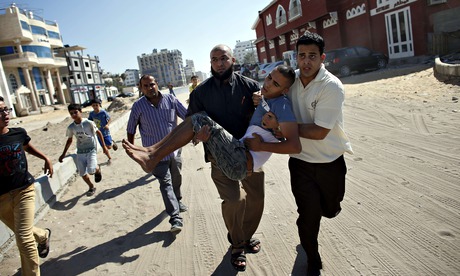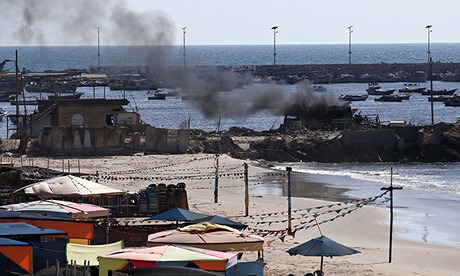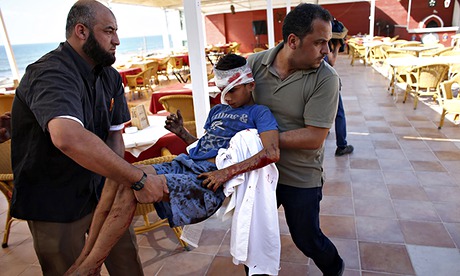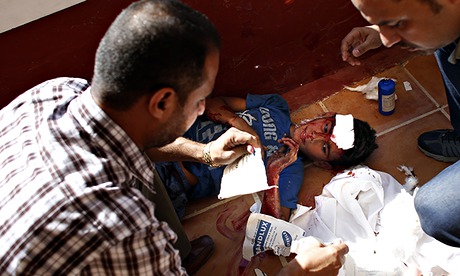
Palestinian employees of al-Deira hotel carry a wounded boy following a strike on the beach in Gaza. Photograph: Thomas Coex/AFP/Getty Images
There is a deafening explosion, then a second. Four children are dead. Four survivors reach the safety of our hotel
The first projectile hit the sea wall of Gaza City's little harbour a little after four o'clock. As the smoke from the explosion thinned, four figures could be seen running, ragged silhouettes, legs pumping furiously along the wall. Even from a distance of 200 metres, it was obvious that three of them were children.
Jumping off the harbour wall, they turned on to the beach, attempting to cross the short distance to the safety of the Al-Deira hotel, base for many of the journalists covering the Gaza conflict.
They waved and shouted at the watching journalists as they passed a little collection of brightly coloured beach tents, used by bathers in peacetime.
 Smoke billows from a beach shack following the in Gaza City which killed four children. Photograph: Thomas Coex/AFP/Getty Images
Smoke billows from a beach shack following the in Gaza City which killed four children. Photograph: Thomas Coex/AFP/Getty Images
It was there that the second shell hit the beach, those firing apparently adjusting their fire to target the fleeing survivors. As it exploded, journalists standing by the terrace wall shouted: "They are only children."
In the space of 40 seconds, four boys who had been playing hide and seek among the fishermen's shacks built on the wall were dead. They were aged between seven and 11; two were named Mohammad, one Zakaria and the youngest Ahed. All were members of the extended Bakr family.
Three others who were injured made it to the hotel: Hamad Bakr, aged 13, with shrapnel in his chest; his cousin Motasem, 11, injured in his head and legs, and Mohammad Abu Watfah, 21, who was hit by shrapnel in his stomach.
 Palestinian employees of Gaza City's al-Deira hotel carry a wounded boy following the shelling nearby on the beach. Photograph: Thomas Coex/AFP/Getty Images
Palestinian employees of Gaza City's al-Deira hotel carry a wounded boy following the shelling nearby on the beach. Photograph: Thomas Coex/AFP/Getty Images
A man who had been near them reached the hotel terrace first, scrambling up a steep sandy bank. A skinny man in his 30s, he groaned and held up a T-shirt already staining red with blood where he was hit in the stomach. He fainted and was carried to a taxi waved down in the street as he grew pale and limp.
The children were brought up next. Pulling up the T-shirt of the first boy, journalists administering first aid found a shrapnel hole, small and round as a pencil head, where he had been hit in the chest. Another boy, a brother or cousin, who was uninjured, slumped by the wall, weeping.
The injured boy cried in pain as the journalists cleaned and dressed the wound, wrapping a field dressing around his chest. He winced in pain, clearly embarrassed too as a colleague checked his shorts to look for unseen femoral bleeding. A waiter grabbed a table cloth to use as a stretcher, but a photographer took the boy in his arms to carry him to the ambulance.
 Employees of Gaza City's al-Deira hotel take care of a wounded boy. Photograph: Thomas Coex/AFP/Getty Images
Employees of Gaza City's al-Deira hotel take care of a wounded boy. Photograph: Thomas Coex/AFP/Getty Images
The Israeli military said it was looking into the incident but claimed that preliminary inquiries suggested that no naval gunfire, originally believed responsible, had occurred at the time of the incident.
At the Shifa hospital later that afternoon Hamad Bakr was concious and waiting for surgery to remove the shrapnel from his chest and drain fluid from his chest cavity.
"My father has a fishing boat there. We were playing hide and seek when we were hit. I didn't hear the first one which killed one of us but I heard the second as we were running along the beach. That one killed three more."
His mother Taghrid, aged 35, came into the room. "Why did you go out of the door?" she demanded of Hamad.
She adds: "His brother Younis," who was with Hamad, while he was being treated, "is so scared that he is shaking."
Suddenly angry and grief stricken all at once, she said: "They killed my nephew. Who does that? Who fires on children?"
As the reporters left Mohammad Abu Watfah was wheeled out of a lift after surgery to remove the shrapnel in his stomach, another victim of a war that does not seem to want to end.
The Islamist group Hamas, which controls Gaza, formally rejected Egypt's ceasefire proposal on Wednesday that had been accepted by Israel to end the nine-day-old conflict that has left at least 213 Palestinians and one Israeli dead. In a text message to the Associated Press, senior Hamas figure Sami Abu Zuhri said: "We informed Cairo today officially that we don't accept the proposal they made."
He added that Hamas felt "alone in the field" with little support from the Arab world and called on Palestinian President Mahmoud Abbas, of the rival Fatah faction in the West Bank, to support Hamas' refusal of the ceasefire deal.
Diplomatic sources told the Guardian that they did not believe that a serious new ceasefire proposal was likely to emerge for several days and, even then, securing a deal looked very difficult.
Hamas's rejection came as an Israeli official said the Israeli defence minister had asked prime minister Binyamin Netanyahu's security cabinet to authorise the mobilisation of another 8,000 reserve troops. The military has said that about 30,000 reservists have been called up since the Israeli offensive last week
Israeli experts have been predicting in recent days that any ground attack, which Israel has threatened, may involve overland raids in the Gaza Strip to destroy command bunkers and tunnels that have allowed the outgunned Palestinians to withstand air and naval barrages and keep the rockets flying. Hamas continued to fire dozens of rockets into Israelon Wednesday yesterday.
Hamas views a significant easing of the Israeli blockade as key to its survival, but does not believe Egypt's current rulers – who deposed a Hamas-friendly government in Cairo last year – can be fair brokers.
The Egyptian proposal called for a halt in hostilities by Tuesday night to be followed by talks on the terms of a longer-term cease-fire, including easing Gaza's seven-year-old border blockade by Israel and Egypt.
Israeli air raids on Gaza on Wednesday saw the targeting of 30 houses, including those of senior Hamas leaders, most notably Mahmoud Zahar, Hamas's former foreign minister.
Alongside the air strikes, Israel told tens of thousands of residents of the northern town of Beit Lahiya and the Zeitoun and Shujai'iya neighbourhoods of Gaza City–all near the border with Israel – to evacuate their homes by 8am. The warnings were delivered in automated phone calls, text messages and leaflets dropped from planes.
The Israeli military said in its message that large numbers of rockets were being launched from these areas and that Israel planned to bomb these locations.
"Whoever disregards these instructions and fails to evacuate immediately endangers their own lives, as well as those of their families," the message said.
As relatives gathered not far from the Al Deira hotel to bury the four dead boys, barely 90 minutes after the attack on the beach, the boys' uncle, Abdel Kareem Baker, 41, told journalists: "It's a cold blooded massacre," he said. "It's a shame they didn't identify them as kids with all of the advanced technology they claim they're using."

No comments:
Post a Comment